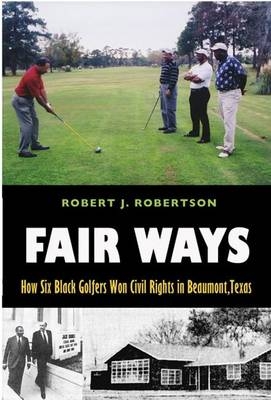
Fair Ways
How Six Black Golfers Won Civil Rights in Beaumont, Texas
Seiten
2005
Texas A & M University Press (Verlag)
978-1-58544-442-7 (ISBN)
Texas A & M University Press (Verlag)
978-1-58544-442-7 (ISBN)
Gives a vivid picture of racial segregation and the forces that brought about its end. The author chronicles three parallel stories in this book. He tells the story of the plaintiffs, of their young lawyers, recent graduates from Howard University law school, and of the Republican judge appointed to the bench by President Eisenhower.
In the summer of 1955, six African American golfers in Beaumont, Texas, began attacking the Jim Crow caste system when they filed a federal lawsuit for the right to play the municipal golf course. The golfers and their African American lawyers went to federal court and asked a conservative white Republican judge to render a decision that would not only integrate the local golf course but also set precedent for desegregation of other public facilities. In ""Fair Ways"", Robert J. Robertson chronicles three parallel stories that converged in this important case. He tells the story of the plaintiffs - avid golfers who had learned the game while working as caddies and waiters - of their young lawyers, recent graduates from Howard University law school, and of the Republican judge just appointed to the bench by President Eisenhower. Using public case papers, public records, newspapers, and oral histories, Robertson has recreated the scene in Beaumont on the eve of desegregation. ""Fair Ways"" gives a vivid picture of racial segregation and the forces that brought about its end.
In the summer of 1955, six African American golfers in Beaumont, Texas, began attacking the Jim Crow caste system when they filed a federal lawsuit for the right to play the municipal golf course. The golfers and their African American lawyers went to federal court and asked a conservative white Republican judge to render a decision that would not only integrate the local golf course but also set precedent for desegregation of other public facilities. In ""Fair Ways"", Robert J. Robertson chronicles three parallel stories that converged in this important case. He tells the story of the plaintiffs - avid golfers who had learned the game while working as caddies and waiters - of their young lawyers, recent graduates from Howard University law school, and of the Republican judge just appointed to the bench by President Eisenhower. Using public case papers, public records, newspapers, and oral histories, Robertson has recreated the scene in Beaumont on the eve of desegregation. ""Fair Ways"" gives a vivid picture of racial segregation and the forces that brought about its end.
ROBERT J. ROBERTSON is a Beaumont businessman, writer, teacher, and leader in local history affairs. His earlier book, Her Majesty's Texans: Two English Immigrants in Reconstruction Texas, is also published by Texas A&M University Press.
| Erscheint lt. Verlag | 31.10.2005 |
|---|---|
| Reihe/Serie | Centennial Series of the Association of Former Students |
| Zusatzinfo | 16 b&w photos, bibliography, index |
| Verlagsort | College Station |
| Sprache | englisch |
| Gewicht | 556 g |
| Themenwelt | Sachbuch/Ratgeber ► Sport ► Golf |
| Geschichte ► Teilgebiete der Geschichte ► Kulturgeschichte | |
| Sozialwissenschaften ► Ethnologie | |
| Sozialwissenschaften ► Soziologie | |
| ISBN-10 | 1-58544-442-1 / 1585444421 |
| ISBN-13 | 978-1-58544-442-7 / 9781585444427 |
| Zustand | Neuware |
| Haben Sie eine Frage zum Produkt? |
Mehr entdecken
aus dem Bereich
aus dem Bereich
780 Greenfee-Gutscheine für 275 Top-Anlagen : alle wichtigen …
Buch | Softcover (2023)
Köllen (Verlag)
34,90 €


